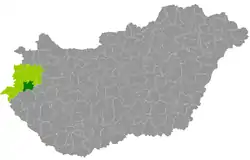Vasvár District
Vasvári járás | |
|---|---|
 Coat of arms | |
 Vasvár District within Hungary and Vas County. | |
| Coordinates: 47°03′N 16°48′E / 47.05°N 16.80°E | |
| Country | |
| County | Vas |
| District seat | Vasvár |
| Area | |
| • Total | 374.14 km2 (144.46 sq mi) |
| • Rank | 5th in Vas |
| Population (2011 census) | |
| • Total | 13,767 |
| • Rank | 7th in Vas |
| • Density | 37/km2 (100/sq mi) |
Vasvár (Hungarian: Vasvári járás) is a district in southern part of Vas County. Vasvár is also the name of the town where the district seat is found. The district is located in the Western Transdanubia Statistical Region.
Geography
Vasvár District borders with Sárvár District to the northeast, Zalaszentgrót District (Zala County) to the southeast, Zalaegerszeg District (Zala County) to the south, Körmend District to the west, Szombathely District to the northwest. The number of the inhabited places in Vasvár District is 23.
Municipalities
The district has 1 town and 22 villages. (ordered by population, as of 1 January 2013)[1]
- Alsóújlak (599)
- Andrásfa (222)
- Bérbaltavár (558)
- Csehi (246)
- Csehimindszent (363)
- Csipkerek (342)
- Egervölgy (352)
- Gersekarát (648)
- Győrvár (594)
- Hegyhátszentpéter (105)
- Kám (398)
- Mikosszéplak (312)
- Nagytilaj (138)
- Olaszfa (383)
- Oszkó (637)
- Pácsony (285)
- Petőmihályfa (203)
- Püspökmolnári (878)
- Rábahídvég (1,024)
- Sárfimizdó (83)
- Szemenye (318)
- Telekes (523)
- Vasvár (4,387) – district seat
The bolded municipality is the city.
Demographics
Religion in Vasvár District (2011 census)
In 2011, it had a population of 13,767 and the population density was 37/km².
| Year | County population[2] | Change |
|---|---|---|
| 2011 | 13,767 | n/a |
Ethnicity
Besides the Hungarian majority, the main minorities are the Roma (approx. 300) and German (200).
Total population (2011 census): 13,767
Ethnic groups (2011 census):[3] Identified themselves: 12,709 persons:
- Hungarians: 12,141 (95.53%)
- Gypsies: 290 (2.28%)
- Germans: 175 (1.38%)
- Others and indefinable: 103 (0.81%)
Approx. 1,000 persons in Vasvár District did not declare their ethnic group at the 2011 census.
Religion
Religious adherence in the county according to 2011 census:[4]
- Catholic – 10,208 (Roman Catholic – 10,184; Greek Catholic – 20);
- Evangelical – 223;
- Reformed – 184;
- other religions – 104;
- Non-religious – 368;
- Atheism – 52;
- Undeclared – 2,628.
See also
References
- ↑ "A KSH 2013. évi helységnévkönyve". ksh.hu. Retrieved 2017-10-27.
- ↑ népesség.com, "Vasvári járás népessége"
- ↑ 4.1.6.1 A népesség nemzetiség szerint, 2011, (in Hungarian)
- ↑ 4.1.7.1 A népesség vallás, felekezet szerint, 2011, (in Hungarian)
External links